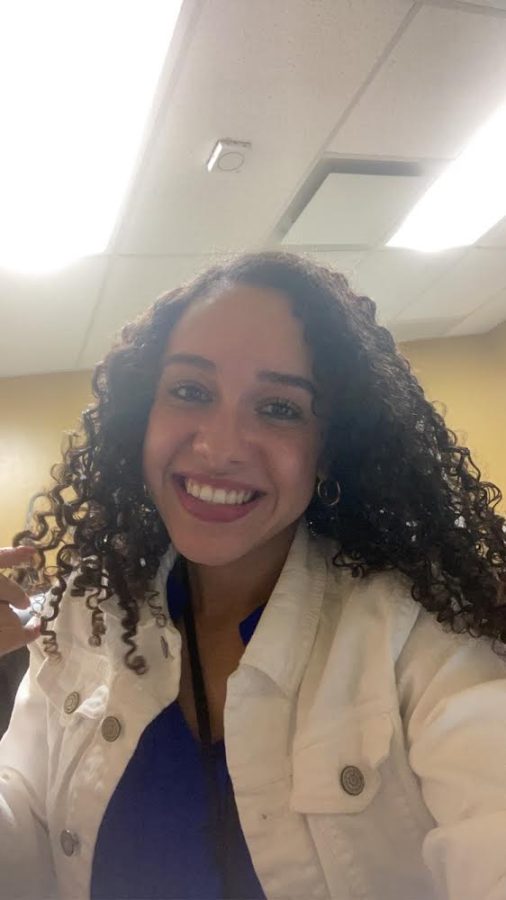Ms. Austin Begins Her South Career With Purpose and Readiness
Ms. Austin takes on a new role at Glenbard South this year, the student support specialist. Source: Ms. Austin
September 26, 2022
Staff member Ms. Austin has a new role this year at Glenbard South, one that has been newly implemented at three of the Glenbard high schools. This position, officially named student support specialist, was created last year as a response to the ongoing pandemic and the repercussions that it has on students’ lives.
Ms. Austin described the necessity of the role, saying, “[There was an] uptick with students who needed additional support, social emotional and academic support, and many students who were impacted developmentally.”
A primary part of Austin’s job description includes being a hospital liaison for Glenbard South. Austin communicates with Glenbard South students who participate in the partial hospitalization/intensive program. This program serves students who experience mental health obstacles during a regular school day. Austin meets regularly with these students and helps to integrate their coping skills from the program into everyday life. The role of Austin is complex and duplicitous, as it permits her to work alongside students and update their parental figures on academic and emotional progress.
Ms. Austin has a strong background in social work that prepared her for her current employment position. Austin interacts directly with students experiencing social emotional concerns. According to Austin, all first year social work staff members have a personal mentor that aids them in navigating Glenbard South. For Austin, her mentor is Dr. Jones, the school psychologist and 504 program coordinator.
The 504 plan, according to Austin, provides “accommodations for students who have a disability or a challenge that prevents them from succeeding in the academic environment.” Hindrances include ADHD, anxiety or depression, severe allergy, and diabetes.”
Austin maintains that it is so important for self-advocacy skills to be built in high school. Parents are usually big advocates in students’ development and lives at school, but it is essential for students themselves to communicate with teachers when they need accommodations.
Austin emphasizes her ongoing efforts to encourage students in attaining their profile of a Glenbard graduate. The critical skills that Austin builds and emphasizes with her students include self empowerment, confidence, organization and executive functioning abilities. A function of Austin’s job, and one that she deems her favorite, is going to annual freshman meetings and eligibility meetings for students searching for a 504 plan. She noted that creating “action plans” for students is rewarding.
Austin details another significant aspect of her job, stating, “I enjoy focusing on students’ strengths and skills they already have and what we can do to set them up for success; essentially being a cheerleader and coach for them. Everyone faces different obstacles at home that are sometimes undetectable, but the most important question is ‘What can we do to help them?’”
When asked about how her interest for social work was kindled, Austin stated that her mother was a middle school social worker, and gaining insight into that particular career field served as a wonderful glimpse into her prospective job description.
In terms of education, Austin also earned her Masters degree in school social work at the University of Illinois in Chicago. During her senior year in undergraduate education, she had two internships. One occurred at a nursing home, while the other was at a non profit organization aimed at working with individuals who have Down syndrome.
Austin cited this experience as extremely impactful, saying, “It helped me gain valuable knowledge on working in a population of social needs. It was a challenge, but strengthened me as a professional.”
In terms of a day-to-day regimen, Austin’s work days vary widely. Sometimes Austin’s meetings with students fall through. Emergency situations can also prevent a consistent schedule, which is why prioritizing tasks, building time management skills and being flexible are important ideas that Austin lives by.
Austin had the privilege to work in an extremely diverse high school population during a prior employment experience. Austin loves working with the high school age group, since according to her, “Adolescents experience integral obstacles and triumphs before emerging into adulthood.”
One of Austin’s chief and guiding principles which she hopes to keep with her during her time at South, as well as communicate to her students, is one of perseverance. “Perhaps this is a situation that we can’t change, but we can think of it in a different way,” her mantra states “A student can acknowledge that they have the power to start their own life and focus on what they can control with purpose.”
































